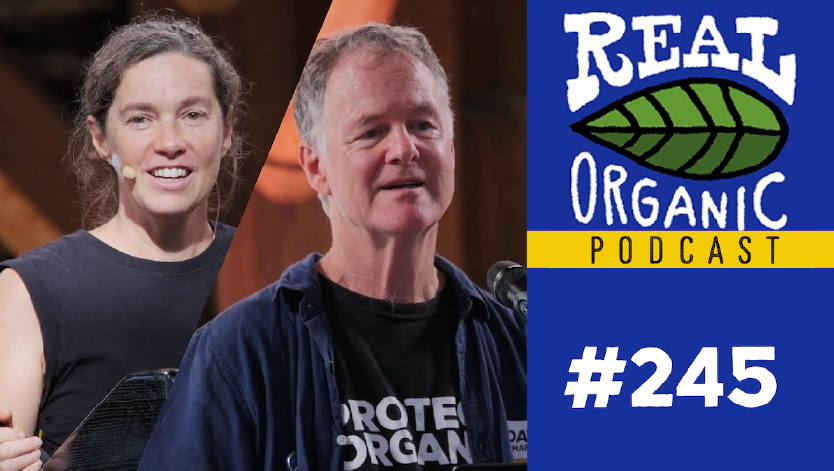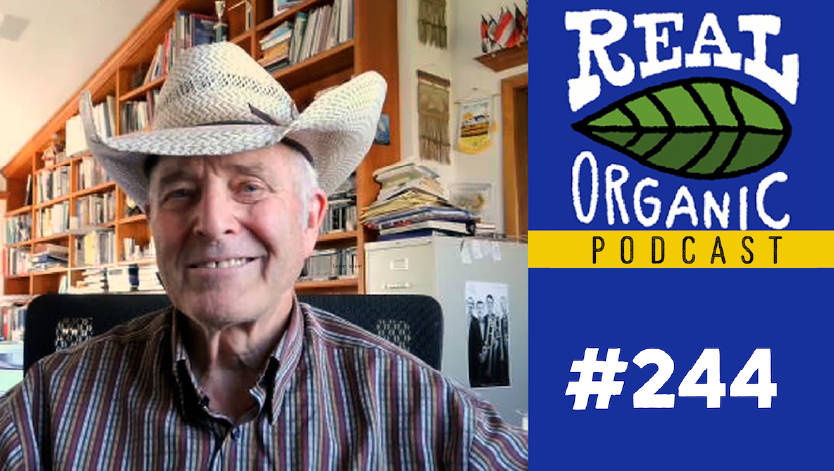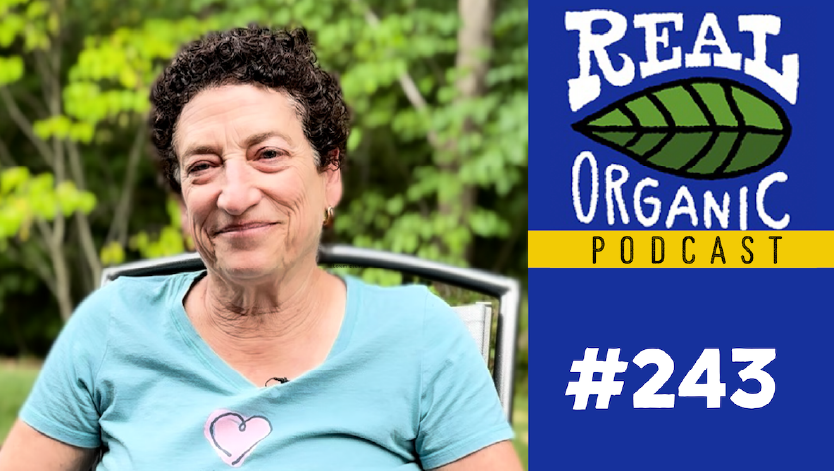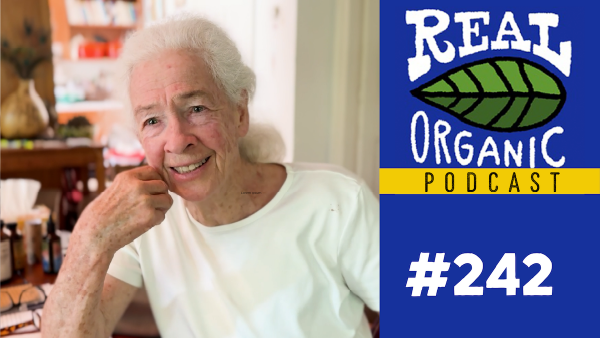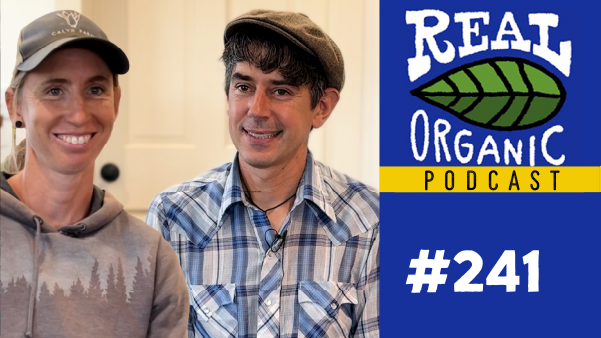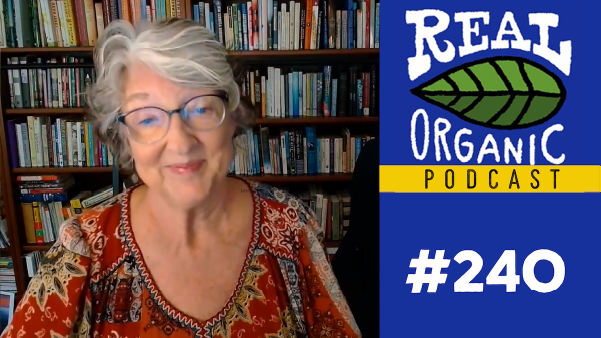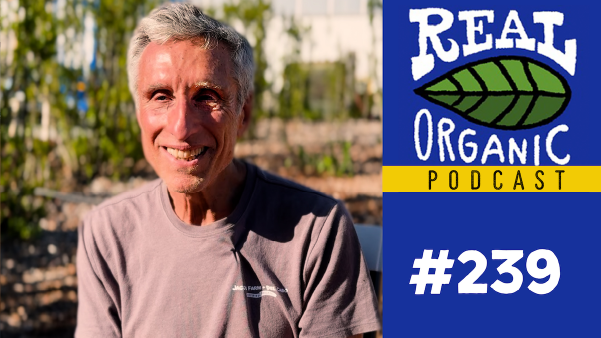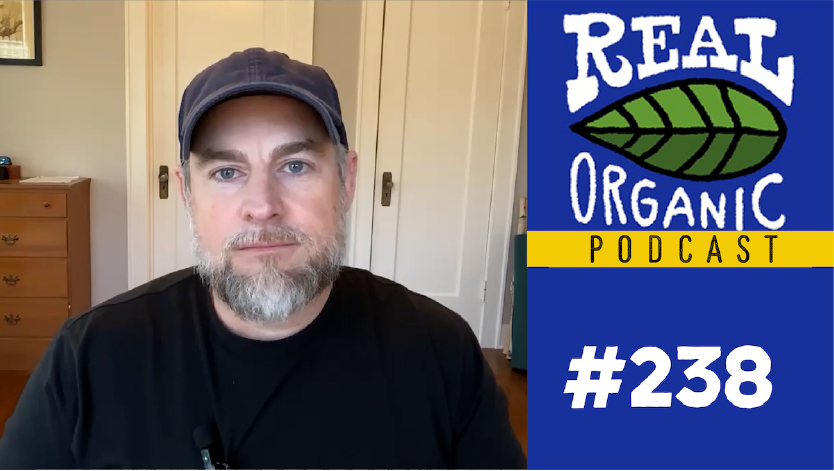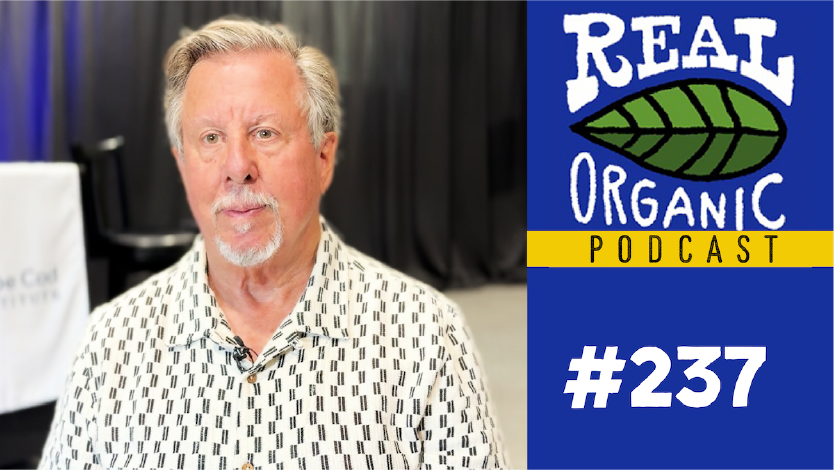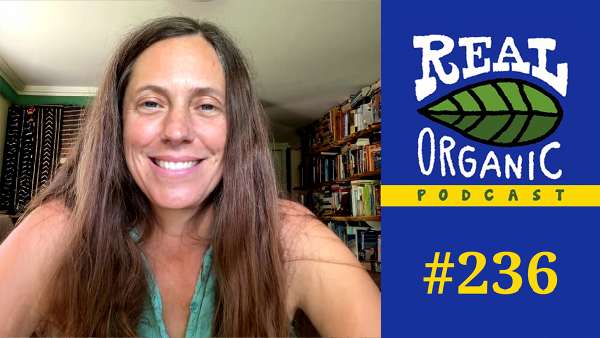Episode #172
Kat Taylor: Funding The World We Want
Welcome! You can subscribe and download episodes of our show through your favorite podcast app.
You can also subscribe to receive the video version of each episode on our YouTube channel.
Our Kat Taylor interview has been edited and condensed for clarity.
Dave Chapman interviews Kat Taylor:
Dave Chapman 0:00
Welcome to The Real Organic Podcast. I’m talking with Kat Taylor today. Thank you. So you are unique among the people whom I’m interviewing and being the one most deeply steeped in banking in the world of banking. And Zephyr Teachout’s book, which is really inspiring this year symposium is about the concentration of money and power in these various industries. And banking is one. And farming is one. And, you know, I really when I started going in and trying to reform the USDA Organic Program, I didn’t get it at first, and I thought we were just dealing with somebody made a mistake. And clearly, if at that point, it was about hydroponic, clearly, it doesn’t qualify for organic, it doesn’t fit. The law doesn’t fit the organic food production act, it doesn’t fit any of our beliefs, and it doesn’t fit the international standards. And I thought, well, someone’s not paying attention. I discovered I was wrong.
Dave Chapman 1:09
People were paying attention at USDA, they just simply had been lobbied to go the other way. And we weren’t against one little company were against the biggest organic produce company in the world, our friends at tricycles, and also just about, you know, one of the biggest non organic companies in the world as well for food. They got set by their own claim 70% of the organic berry market, which is so far beyond what’s considered a monopoly, right and break them up, they’re looking at at maybe 4%, of an industry might be considered a monopoly, although a local monopoly would still be a monopoly, and they might only be a half percent of the national but so you, you’ve worked a lot in food, and you’ve worked a lot more in banking. And one of the things that Zephyr said is it, it always comes back to Wall Street, it always comes back to these big banks, which are woven in to these industries. Do you agree with that? Can you tell me what what banking looks like and how it relates to the rest of our lives.
Kat Taylor 2:24
So you hit a subject near and dear to my heart, I will say I’m a naive, I didn’t grow up in Well, I kind of grew up in banking as my grandfather ran a bank Crocker National Bank. But I didn’t expect to be a banker. I don’t have a storied career in finance or anything like that. But being naive is actually an advantage sometimes to and that you look at a system with fresh eyes. Past is not prologue, you don’t just take it for granted that that’s the way it’s always been. That’s the way it always will be. So my partner, Tom Steyer, and I started a bank on the hunch that something was terribly wrong in the financial system. It seemed to be not serving people and planet, and it was very consolidated and corrupt.
Kat Taylor 3:05
So in 2002, I think there were 16,000 banks in in America. Now they’re about 5000. So that’s a lot of consolidation. Banks, banking, and the financial system is one of the biggest industries, if not the biggest industry in the world, just to sort of right size it 2022, or 2021, GDP in the US was $23 trillion, about the total asset size of the top 10 energy companies worldwide. And that, by the way, that that includes all the big ones, but is about 10 trillion in assets, ones revenue number ones and asset number of it’s still just to give you the size of this, this sense of the scale. The financial service system in the United States alone, which had been only has all the big money center banks is 123 trillion in assets. Just think of that 23 trillion of revenue in the United States, in one year, 10 trillion of assets in the biggest energy companies. And 123 trillion in the financial system service just in America, you probably need to add another 60 trillion if you count the shadow banking system, things that are happening on the blockchain or in the Dallas are, are just not detected.
Kat Taylor 4:23
So that’s a massive industry. And it’s powerful because of three things. First of all, it drives every other industry, every other industry is dependent upon finance and bank financed as well. It’s also a highly leveraged model. So essentially, this is not the fractional reserve system, which is more complicated to go into. But a simplified version of that is in our bank for every $1 of equity. We put in the bank, we can collect $9 of deposits and make a $10 loan so that’s 10 times leverage. The biggest banks are levered much, much more. Bear Stearns, when it collapsed was 33 times levered. So in addition to that, when you make loans, they come back and you make them again. So the money has cumulative effect over time. So these are the sorts of powerful dynamics of banking. But it is also not Allegiant to what I believe it should be. Banking, to me should be the original, most powerful form of crowdfunding. Meaning that people take their idle cash, their deposits, they put them in banks, ostensibly to finance the world in which they actually wish to live. But they’ve been severed from their agency and accountability over where their money sleeps at night.
Kat Taylor 5:45
So the biggest banks in the system are literally using our own deposits against us in the main, and there’s a litany of parade horribles that they have and continue to march out against us. 10 10 million homes lost in the foreclosure crisis of 2008, massive penalties for consumer fraud that they just pay as a cost of doing business. 1/3 of bank tellers are in some form of public assistance, shifting a private cost to a public resource, hundreds of billions of dollars of fossil fuel finance since Paris Accords, where they showed up and made a lot of claims that they haven’t followed through on. So the system has to change. And consolidation is one of the problems of it. And I’ll give you a real time right now. Example, after the failure of Silicon Valley Bank, and then a first republic bank, there was a flight to subsidy of the deposits. That’s not a flight to safety.
Kat Taylor 6:42
The Big Five money center banks are not safe. They’re not reasonably managed. They’re not aligned with our values. They are simply simply subsidized by the American taxpayer, because they are once again too big to fail. So if you’re nervous, or if you have fiduciary duty, or your venture overlords tell you get your money in a money center bank, you do it. And we saw a rush to subsidy of deposits in the United States landscape to the big banks after those failures. That’s a real problem. Because those big banks don’t finance Main Street economy in the main, they aren’t in the capital markets. They are kind of like big hedge funds. And the real banks that finance the circular and local living economies have the main street economy in America upon which we all depend where the lion’s share of the highroad jobs come from, is done by the regional community and CDFI Banks.
Kat Taylor 7:37
If we suck all the deposits out from those banks and send them to the big banks, we’re going to see a credit contraction in Main Street economy. And that’s dangerous for us all. Our bank, beneficial State Bank has managed to hold on to our deposits, because we offer insured products were considered very safe and sound. And we have alignment people make with us for 100 reasons because they’re like you, they’re terribly concerned about organics and where that’s going, or they don’t want to have anything to do with fossil fuels or private prisons or extractive finance, or they just want to make sure that their community is well served by an economy that has access to bank credit.
Dave Chapman 8:15
Okay, there’s a lot there, of course. So just to tease it apart, the big banks keep getting bigger. Yep. And as as is true of, of every industry in America at this point, yeah, there is this tendency I trend, I’m not sure if it’s inevitable towards consolidating money and the power. So as they get more consolidated, they can basically tell the government and other businesses what to do. Right. And that’s true for banking as well.
Kat Taylor 8:52
Yeah. Yeah. The bank lobby is very powerful, as is the big ag lobby,
Dave Chapman 8:57
very powerful. All of the food system. It’s not just big ag, but it’s big retail, too. You know, the stores that we sell to. Three of the chains I’ve sold to now are owned by one Dutch multinational. These are big changes, like stop and shoves a big chain. And and you know, Albertsons and Kroger’s and Amazon, and Whole Foods. So as that happens, people lose choice. I’m not sure people are aware of that in banking, as they aren’t food and they’re not that aware of it and food, they go, they go to the store and they go off, look at all the choices I have. But actually the choices are fewer and fewer small local farms. Yeah. And by small, I don’t mean tiny, I mean, you know, even even 500 acre vegetable farms are no longer being welcomed on the shelves. Yeah. So as they lose these choices, I think the world gets to be a poor place and we lose a lot of good things. Tell me about in banking what We lose when Bank of America wipes out another little bank. And that’s interesting. I didn’t think of that, that when people get scared, they put their money in bank of America, and they pull it out of their local bank. Right Bank of America is not going to fail.
Kat Taylor 10:14
Yeah, yeah, won’t be allowed to won’t be what so there is that credit. contraction in the local economies happens when banks consolidate, they’re just fewer community and regional banks to serve local economies. It the biggest banks set price basically, in the industry, they sent term. So when you go when you pull your deposits out and go to one of the big money center banks, like who you’re attracted by remote deposit of your check, while you’re reading your New York Times on a Sunday morning, or there’s so many branches, or the online banking, superior things like that, where you don’t realize is when you put your deposits there, you are backing a lending practice that’s working quite heavily against you. So it is pernicious kind of dynamic that the money goes to the big banks, and then they finance you know, a world where they burned down the planet and exploit a bunch of people. Sorry, it sounds so harsh and what’s the right word? Immoderate, I guess? But it’s of crisis proportions. The banks are killing us.
Kat Taylor 11:24
So also, what I what I see happening in the big ag system was identified for me by a paper that Oxfam International wrote probably 20 years ago now called Cereal Secrets, c e r e a l about the big trading companies are Archer Midland Daniels, Bungie, Cargill, Louis Dreyfus, they call them the ABCDs. And it was the story of the financialization of our food system, where now the on the value chain, the lowest return goes to the Land Steward lease or owned, and the highest return goes to the Commodity Futures Trading firms, Goldman Sachs, India, China government’s. And it’s siphoning off all the return from the very essential act of land stewardship, value, add product, small distributors, so on and making that job making that business model broken, it’s you know, the margins and farming, as you say, are very, very poor. And that leads not only to precarity of the producers, particularly smaller scale, family owned, organic regenerative, but it also really interferes with succession. I mean, how many young people want to go into farming right now, because it’s hard to make a living much less send your kids to college and have a retirement asset. So that I feel the same thing is happening in the financial system that were driven more and more to such powerful actors that we have to take price and term off of them.
Kat Taylor 12:58
And they’re very sneaky. So while you know, Chase may look like it has great pricing on its checking accounts and benefits and no fees. The hidden fees are incredible. And when WAMU failed, Washington Mutual, they did a calculus that their free checking accounts cost the average account holder $500 a year, that’s going backwards. That’s your savings being eaten up and going into a deficit position for in many cases, since the average American I think doesn’t have I forget what it is $1,200 for an emergency or something is a low number. So this can be reversed. And I won’t skip add to this very long answer. But if we can talk about platform cooperatives, because what you identified, to me is a global phenomenon, that now that there’s almost unlimited computing power, and the world is connected, even low income, low income communities are early adopters of cell phone, smartphone, etc. It increases the chance of network effects arising and taking hold and network effects produce monopolies and oligopolies. That’s what Netflix, Amazon Prime, Facebook, Instagram, Amazon, et cetera. To me, those are based on network effects. And once they get built, they’re very hard to dismantle.
Dave Chapman 14:22
Okay, so just slow it down for a minute. People. What is the network effect? Yeah,
Kat Taylor 14:28
so So, I am an amateur explainer, meaning I just learned this a minute before I explained it to somebody else, but a
Dave Chapman 14:36
10 year old kid, so why don’t get it what’s a network of so
Kat Taylor 14:40
it helps if we workshop these terms together. So my understanding on network effect is a network effect happens when the value to the membership increases with every member who joins. It could be a member, it could be a user, it could be a consumer, it whatever it is email, email, civilization, actually is kind of a network effect. So they tend to spiral up. The more members who join, the more that membership offers the dominant competitive offering, the more members who join, so it’s spiraling up. So and that’s why you see, in my opinion, you see big corporations getting venture funding for years with no no revenue with no earnings. Because they’re establishing a network effect, they are willing to give the membership away, or sell under market in order to attract all those users and create the network effect. They also reverse network effects you could the old fashioned way is rats leave call it as rats leaving a sinking ship.
Kat Taylor 15:44
But if you remember MySpace, it was here for a whipstitch it was the Facebook Like platform, and the network effect went away for them when Facebook built in much more more quickly build a much more competitive platform on which the network effect rests. So that all the bells and whistles and functionality and features and new products. And so that’s what those platforms are constantly building their capital providers building the floor upon which we walk to hold the network effect, you can lose a network effect by competition from a superior platform, you can also use it from a threat to the membership. So when Facebook revealed that Cambridge Analytica had come on the platform and was using, basically using the members in a bad way that Facebook was terrified, they would lose, not just members, but maybe the network effect. This is my opinion. They instantly bought Instagram and WhatsApp maybe that was on their roadmap anyway, but they had to buy other network effects onto which the defection could go. So if you’re going to get mad and leave Facebook, you went to Instagram. That actually is what happened.
Kat Taylor 16:54
When Instagram had Tiktok threatening it as a competitor platform, it may immediately built reels. So the capital providers are actually they are truly adding value. But they aren’t the only ones adding value. That is those network effects are really platform cooperatives. And I’ll explain that term to a platform cooperative recognizes that more than the capital providers are creating value on the platform. It’s just not cooperatively held. So yes, Facebook built I mean, Instagram built reels. But most of the value on Instagram comes from not just the user’s data, although that’s a big factor. It’s from sharing shopping query and creating content connecting with others, that creates value on the platform that secures the network effect and attracts more value production. The problem is it’s not compensated in economic terms in a platform cooperative.
Kat Taylor 17:53
Finally, that social production which is productive, which is value created not by the capital holders, but by everyone else in the mix, is socially compensated. So in a platform cooperative, you would actually accord not just revenue like YouTube is doing ride sharing. Now they’re giving some revenue to their most prolific content creators, but more magical thing would be to give them a small micro share of equity ownership in the platform is verified on the blockchain, which over time proliferates the ownership, control and governance of the platform. We’re not getting rid of monopolies and oligopolies. In my humble opinion, because of those network effects. They’re going to keep happening unless we have massive social disruption of some sort, which is also possible. So in the meantime, why don’t we proliferate the ownership control and governance of them so that they don’t beat us up? They are weak, when it’s no longer they and us and with where they have all the power, we have power on the network, even majority power on on the network effect? Why would the capital holders give up any equity to the users who are creating all that value, because it’s the best way to secure the network effect from a defection. Once you own a little bit of that platform, you’re not going to leave, you’re going to stay there, defend threats, add value, keep adding value. And that that should be something very worthwhile to the capital providers. Because in the other scenario where they lose the network effect, they could go from being worth $200 billion to zero. In this scenario, they go from being worth $200 billion to $100 billion. That’s still pretty good. So that thank you for letting me spin that out. But that’s kind of where I’m spending a lot of my energy and attention right now. In finance, in Ag in media, all the systems that are have become increasingly corrupt through Collins consolidation. Okay,
Dave Chapman 19:49
So let’s let’s talk a little bit about what can we do about solutions as we as we look at this. People are so confused and You know, we all get the question, What can we do is if like is if I knew. So I’m trying to understand well, what what can we do? And it seems like there are two paths. And one is, is, let’s call it the Thoreau path, you know, which is I want to do the right thing in my life because it I’m more who I want to be if my actions are in alignment with my values. And the other is the Martin Luther King approach, which is, I want to do all that. But I also want to create legislative change. Yeah, so So King was quite strategic in his acts of civil disobedience. I don’t think the role was at all strategic, he didn’t really, really want to change the government, he was interested in his own salvation. So they’re both important in my opinion. If we say, well, you should make sure that you keep your account in in, you know, a beneficial bank. That’s, that’s taking personal responsibility. And it’s, it’s not necessary. Well, it’s not at all changing the system unless we’re so successful at getting millions of people to do it, that the system shifts. Yeah. What what do you what’s your answer to that? You know, I’m sure you thought long and hard about this. Yeah,
Kat Taylor 21:17
yeah. So today, we’ve pursued three strategies on our theory of change, because we don’t want to be a good bank and a bad system to your point. It’s, that’s not enough for where we are right now. So we need to flip the whole system away from a consolidated industrial model to a regenerative distributed model. So, you know, maybe a federation of once again, 12,000 banks that are medium sized, maybe they’re not itty bitty and don’t have good unit economics, but their reasonable size and allegiance to our values and supporting local economies, and the planet.
Kat Taylor 21:56
They were the three strategies. Our first one you mentioned, consumer strategy, which is inspired people to move their money into a bank, that’s accordance with their values. That were they take up their agency and their accountability. So it’s not just they’re not mistreating me. But I like what they’re lending to. That’s the way we brand ourselves come to us, you’ll get fair financial services, our lending practice is not not just not doing bad things, it’s proactively financing the renewable economy, that’s also racially and gender just so those consumer movements got some loft, when the activists around other issues like the Dakota Access Pipeline, or Black Lives Matter recognize the power of finance, and they started call for people to pull their money from the banks finest fan needs in the pipeline. I think in the first month, $100 million left the banks, it’s tiny in the banking system, because the biggest banks are well over $2 trillion in assets. But it’s a start, we add on to that consumer layer, the industry relations is what we call it, we try to convince other banks that we just have a better business model, it’s more resilient, it’s more reliably profitable, it doesn’t have reputational risk.
Kat Taylor 23:18
So you come to us, even if it’s just a better way to make $1, and align, and you have new generations who are increasingly going to insist on this, they’re going to be sophisticated enough to know that your lending practices bad for them, or that you’re overcharging them, or underpaying your colleagues or throwing your garbage over the fence all the things that corporations do to maximize profit. So that’s sort of in the stakeholder capitalism realm of we can get to almost like a compact as a society that will only support companies that recognize all their stakeholders and provide benefit to all in harm to none. And that would be like the V corporations. And you know, there’s markers that we have to indicate that for somebody who doesn’t have hours to pour over all the financials and so on.
Kat Taylor 24:04
The third layer is we call regulatory, but it’s policy as well. So we’re asking our regulators to ask more of banks. We’re already regulated not just for safety and soundness, but for a variety of non financial performance indicators like fair lending, or anti money laundering or cybersecurity, these things that keep society safe and fair. It hasn’t been done perfectly because the bank’s redline for decades against black and brown communities. But it’s a start of saying that a bank is a quasi public institution. It owes us more than just being a safe place to put our money. On top of the regulatory we venture into policy all the time so I’ll give you two examples. We were very instrumental in establishing will read actually reorganizing the main banking relator which is in California biggest bank market, the Department of Business Oversight into the depart ATM is of financial protection and innovation. So that was you guys need to regulate for more than just financial soundness, you should be enabling beneficial innovation and you should be protecting consumers in your market – California’s markets, from bad bank behavior.
Kat Taylor 25:17
We did that because it had been done at the federal level in the establishment of the Consumer Finance Protection Bureau under the Obama administration with Rich Cordray and Elizabeth Warren, but it was dismantled by Trump. So we thought we need to have one in California, it’s not only good for us here, it will regulate the markets outside of California, because banks don’t build product for California and then build something different for Wisconsin, just like the automakers build their cars for California. And Wisconsin gets the same cars. The other policy that we’re advocating for right now, and this is not mostly the big banks advocate for policy that’s self serving, we won’t do that we will only advocate for a policy that we think is altruistic and good for the whole system. So the other one we’re advocating for, is to raise the FDIC insurance coverage level from $250,000 to five or $10 million. That sounds like a pro bank sort of move. Like why would we want to let the banks have that?
Kat Taylor 26:19
But if you think about it, defacto the biggest banks in the system have unlimited FDIC insurance, they will never fail. That’s the equivalent of unlimited FDIC insurance. And that’s at the cost of the taxpayer. The banks pay premiums into the FDIC insurance fun. But if it’s not enough, the taxpayer backs it up. So why should they have unlimited and we have so it’s such a small amount of protection, it doesn’t cover three months of an average company in the main street economies, payroll, and they have to keep that in cash. So let’s give a limit on certain accounts that allow for the protection of workers wages, essentially, if you think about that, and keep the deposits in our institutions, because it’s no longer seen as risky to have them there. You’re not going to lose your payroll cash, it’s going to be protected by the FDIC. And I think we’re a safer bet. Anyway, the big banks are full of risk, as we saw in 2008.
Dave Chapman 27:19
Right, right. Okay, I’m kind of curious, just how did you go about who did you lobbying? I mean, what what was your coalition of people supporting that? effort?
Kat Taylor 27:32
So banking, like food, attracts almost every stakeholder group just through a different door? Yeah. So a food example, we just a coalition that we helped lead just provided the political cover for the governor to allocate permanent funding to universal free meals in school, 6 million Californians chose school children will now have free breakfast and lunch, no matter their status, they don’t have to report. You don’t have the stigma. We’re we’re working feverishly to make sure it’s healthy food. But that’s really it’s a moral thing to do for the children for their educational readiness and lifelong health. It’s also the right thing to do for the supply chain. It’s a big demand trigger for Regenerative organic product that
Dave Chapman 28:22
I just ask you about how many of those kids are food insecure? What would you guess?
Kat Taylor 28:28
So the food insecurity standards for free and reduced lunch are low for California, because it’s such a high cost of living state. Nonetheless, a lot of the districts are 95% eligible for free and reduced. Some are not, but we have a poor, low to moderate income base in our school population, that a lot of the wealthier children are going to private schools or charter schools or whatever. So a very high percentage, they estimate a third of the children, at least a third of the children, I think, in California, if not the nation, received the majority of their calories from school food. Yeah. So it’s a really important, it’s a crisis that we’re not and that we don’t see food as part of education is conceptually problematic, but
Dave Chapman 29:15
huge impacts on those kids about what they get to eat at school.
Kat Taylor 29:19
And the first five years, you know, if you’re have a heavy salt, fat and sugar diet, you’re going to have a lifelong trajectory of disease of serious disease. So it was very important to do. The coalition of 208 organizations was not just food, ag and education, which you would expect. It was health care, labor, economy, climate environment, because all those groups saw something they gain from universal free healthy meals. They also recognize that if they went individually on their single issues, they get nothing when they go together, they get it all. So I that’s a A little bit of the DFP API is that we were able to attract a lot of consumer protection groups who saw that finance is not only a dangerous product in and of itself is it as Elizabeth Warren said, you can’t sell a toaster that blows up in your kitchen, but you can sell a mortgage that blows up your home sort of thing. But also, that if we could get it right in California, it would spread throughout the country. And that bank finance drives a lot of other consumer protection issues like E commerce, like how things are financed, and how you end up paying, you know, four times the cost of your sofa, because you got high priced appliance, you know, that sort of onsite furniture, financing stuff,
Dave Chapman 30:42
do the consolidated banks, which is, as I say, what we see in every every industry. Does that? Are they blood brothers and sisters to consolidation? In food and consolidation? And retail? Is there a natural recognition? Or it doesn’t have to be personal? But But is there a natural Alliance there?
Kat Taylor 31:08
Probably, I haven’t studied it enough. So I’m going to just say what I think I could deduce. First of all, we at our bank, we’re almost to 2 billion in assets were like 1.8, something like that. So that’s a big community bank, as a tiny bank in the system. As I said, the biggest banks are over 2 trillion in assets. We have a hard time financing, crop or land and ag, because the units are so huge, you know, like the average size of a commodity farm, which we wouldn’t want to finance anyway, but his 5000 acres. So I suspect that big finance is in league with big ag, because that’s the scale of capital needed. And also, since they’re so vertically integrated, you know, really big ag is big chemical. That’s what I think about it. And so probably big chemical also requires that kind of capital markets, finance. Moreover, big banking has not shown any reluctance to finance almost anything. I mean, they’ll say, we won’t finance something illegal, but that hasn’t been true over time. So I mean, it’s sort of like, they’ll play with anyone. Yeah.
Dave Chapman 32:28
Do you think that we have antitrust laws that are not enacted? They’re not applied that kind of? Yeah, I think that ended was Robert Bork, maybe that they said, We’re gonna have a new interpretation for what it means to be a destructor of monopoly. Yeah. Yeah. You know, they they said, as long as it’s not raising the price of the product. We’re okay with it. Yeah. And when the when the laws were passed, that was not the point. To have cheap consumer goods. The point was to have a viable democracy. Yeah. And to stop it from a small number of people having a huge amount of power and influence. What happens? Do you think it’s possible to bring those out of the closet, dust them off? Yeah. And, and go forth and break them up?
Kat Taylor 33:16
I see signs of white, and I see obstacles. This is not a great Supreme Court for us. Once again, honestly, with all due respect to the justices who are exemplary people, for in the main, the Supreme Court, to me has been late to the right decision, and often wrong. It’s, it’s, it’s not been a good phenomenon. For us. I mean, just think about slavery or a lot of other issues of the day. So I don’t have a lot of hope that the underlying foundational elements of any trust law, which I don’t know that well, will be somehow improved. But the signs of life I saw is one of the first actions Biden’s Department of Justice took was to go after the the big chicken manufacturers, whatever they call themselves for price fixing. Yeah, which is an antitrust kind of action. So I was thrilled with that, because we I, to my knowledge, we hadn’t seen an enforcement action in decades, in the access
Dave Chapman 34:19
to Obama’s administration tried to go after the chicken industry. And then they got their butts kicked in the midterms and they backed off. Yeah. And Vilsack and holder were going around and having hearings, and all the small chicken farmers were coming up and really putting a lot on stake to testify. Yeah, against Tyson. You’re right against Purdue. And then they got left out to dry because the administration just pulled back. They said, we’re being branded anti business. We’re not going to survive with that. Yeah. It’s a political reality that it’s not as simple as Oh, if we could only elect a champion who would do this. Yeah, they’re still part Have a system to Yeah. And
Kat Taylor 35:01
it’s self reinforcing. Once you have enough power to be corrupt in your lobbying, the lobbying helps you have more power and it just ratchets up. And so I don’t want to sound so hopeless about it. But you know what, three companies control 95% of the beef market. And the mega dairies are as persistent as ever in growing and actually pulling down a bunch of subsidy. I heard that a bunch of the commodity funding that the Biden administration thankfully got through the USDA, you know, it ends up going to the mega producers, because it’s easier to give them $5 million than to hand out $50,000 It
Dave Chapman 35:42
was a lot more than 5 million. Yeah, they were giving 155 million. And they were the very worst players. Yeah, food industry. And this was all in the name of climate smart agriculture. So it was wonderful that the USDA finally acknowledged that this is an important thing that we need to deal with. Yeah, but it was set such a retro response. I mean, they they insisted that there be a bipoc organization with each grant. So they trotted out a small group, they gave a tiny, tiny bit to organic, but most of it by farm went to the Iowa pork growers and and that’s that corruption then Syngenta and Cargill, and you know it of course it’s corruption. Yeah. And it’s heartbreaking because those very companies are the ones who are now defining regenerative for the world. Yeah, yeah. And who’s to say I mean, they have a huge microphone. Yeah. Who’s to say that, that we can stop that? I don’t think so. Yeah.
Kat Taylor 36:47
And even the, the idea of defining regenerative practice is not prescriptive. It’s a set of principles, very context driven. So it giving it a definition is actually going to undermine what it means to me. Very much. So yeah. The I will say there’s another bright light, and it’s a person. So I don’t believe in single hero histories, but it’s very important to have visionaries in the right place and Farm Service Agency, which has hitherto been, you know, a vehicle of oppression and thievery in the Farm Credit System, stealing black farmland and just horrible things going on all over us now run by Zach do Chanel from the intertribal ag Council, who I’m not sure I’m pronouncing the name of this right but he started the CDFI ASA Tommy, I think Indian country and where he comes from. He’s a financial wizard, as well as a fifth generation cattle rancher in the regenerative space, and he’s changing the paradigm of USDA finance. And if he gets that done and it is canonized there, it will mean the difference between investing in our land stewards and food and regenerative food system and crippling it with high debt that keeps it locked in the industrial model. Yeah. That’s a bright light. That’s
Dave Chapman 38:10
a bright light. Well, we got to celebrate when I spoke last night at frogs live and they’re like, this is celebration days.
Kat Taylor 38:21
Because I know it’s celebrate no Dave downers.
Dave Chapman 38:25
And but you know, so I tried to be extremely positive than other people came in, you know, with some of the other uglier truths. Yeah. I think it’s amazing what the EU is doing. Yeah, you know, the Farm to Fork initiative. He’s fighting them tooth and nail. So we have our USDA, of course, is fighting to the death for the chemical lobby. and the EU, is, I don’t think they’ll get there. But they’re, they’ve made a commitment to reducing their chemical inputs by 50% in 10 years in agriculture, and increasing their certified organic land up to 25% of their, of their farmland being certified as organic. These are truly radical aspirational things. And it’s almost ignored even by our friends in this country. And who isn’t ignoring it as the chemical industry and the USDA. Yeah. And they’re ready to fight to the death on this one Yeah. The fight seems to be most brutal in Africa is a lot going on there now with with
Kat Taylor 39:30
that’s a big land grab their two big land ground and that was our the dumping ground for commodity food in America forever destroying the you know, otherwise brilliant, beautiful African markets. Yes.
Dave Chapman 39:42
And now they’ve got the green revolution as packaged by by Bill, you know, and honestly I thought people were picking on him I mean, he has all his problems but another book for you to read is Tim Wise this book, eating tomorrow.
Kat Taylor 39:58
You frame To the bill, I think you’re referring to. Yes.
Dave Chapman 40:02
Yeah. Bill Gates, right. Yeah. Now
Kat Taylor 40:05
Opposition?
Dave Chapman 40:06
Well, yes, I’m in opposition, but I didn’t. I thought he’s being made into the bogeyman a bit in Africa. And I talked to Tim Wise a couple of weeks ago and read his book. And I realized, no, this is bad.
Kat Taylor 40:22
I’m gonna have to go, I think, but I want to end on a positive note. Absolutely. You know, I mentioned about platform cooperatives, what capital provider in their right mind, meaning the current owners would give away their equity. I’m actually not expecting to come from the incumbent leadership. But they have partners, who go by one name, because they’re so famous. Speaking to Bill, Melinda, Priscilla McKenzie, Laureen. I think those are change agents, because they don’t think past is prologue, this world has not been good and good enough to women, or their children. And they’re willing to try new things. And some of them already have a commitment to organically Laureen. So that’s where I’m putting my money on. And I’m feverishly trying to figure out how to convene the likes of those people who, you know, they own big part of those companies, I think, because they’re in community property states and anyway, just just an idea to leave on. But it’s, it’s not over.
Dave Chapman 41:38
It’s not over yet. All right. Thank you so much.


